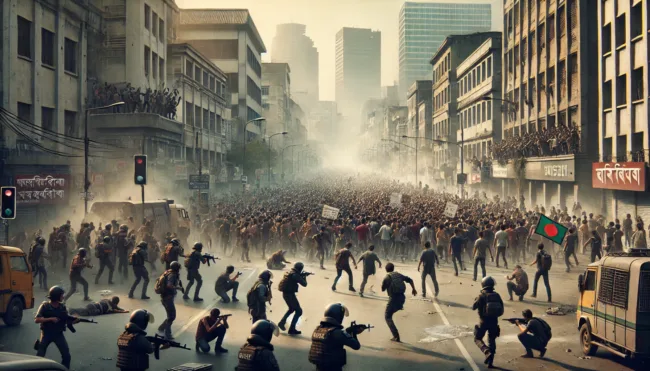Chaos in Bangladesh: Deadly protests spark nationwide crisis
In a week marked by escalating violence, over 30 individuals have lost their lives in Bangladesh, with significant unrest enveloping the nation. The primary cause of this upheaval is a contentious protest by thousands of students against the government’s job allocation system. The situation intensified on Thursday, resulting in 19 fatalities, making it one of the most violent episodes in this ongoing saga.
The protests originated at Dhaka University, a renowned academic institution, and quickly spread to various other cities. The protestors, primarily students, are challenging a quota system that reserves 50% of government jobs for certain privileged groups, including descendants of veterans from the country’s 1971 liberation war against Pakistan. This policy has also extended benefits to various pro-government groups, further fueling the dissatisfaction among other student groups and job seekers.
In response to the growing chaos, Prime Minister Sheikh Hasina has taken drastic steps to curb the violence and restore order. Educational institutions across the country have been shut down indefinitely, and Border Guard Bangladesh personnel have been deployed extensively, especially in critical areas like the capital, Dhaka. The Prime Minister emphasized that those found instigating or participating in the violence would be held accountable, regardless of their political affiliations.

Over 30 dead as protests over government job allocations grip Bangladesh, leading to school closures and a nationwide internet blackout.
Compounding the situation is the government’s decision to implement a complete internet blackout. Netblocks, a watchdog organization, confirmed the severe restrictions placed on internet access across Bangladesh. According to Netblocks, the blackout is an extension of earlier efforts to throttle social media and restrict mobile data services. Zunaid Ahmed Palak, Bangladesh’s junior minister, defended the blackout, stating that social media had been weaponized to spread rumors and misinformation, exacerbating the unrest.
This development has significant implications for freedom of speech and the right to protest in Bangladesh. The internet shutdown severely hampers communication and the dissemination of information, crucial during times of political crisis. International observers and human rights organizations have expressed concern over the government’s heavy-handed approach, particularly regarding the suppression of democratic expressions through internet censorship.
The situation in Bangladesh represents a critical juncture for the country’s governance and its approach to civil liberties. The government’s measures, while aimed at restoring order, suggest a potential overreach that could stifle democratic engagement and escalate tensions further. It is imperative for all involved parties to seek a resolution through dialogue and reconsider the policies that have led to such widespread discontent.
Discover more from Business-News-Today.com
Subscribe to get the latest posts sent to your email.

